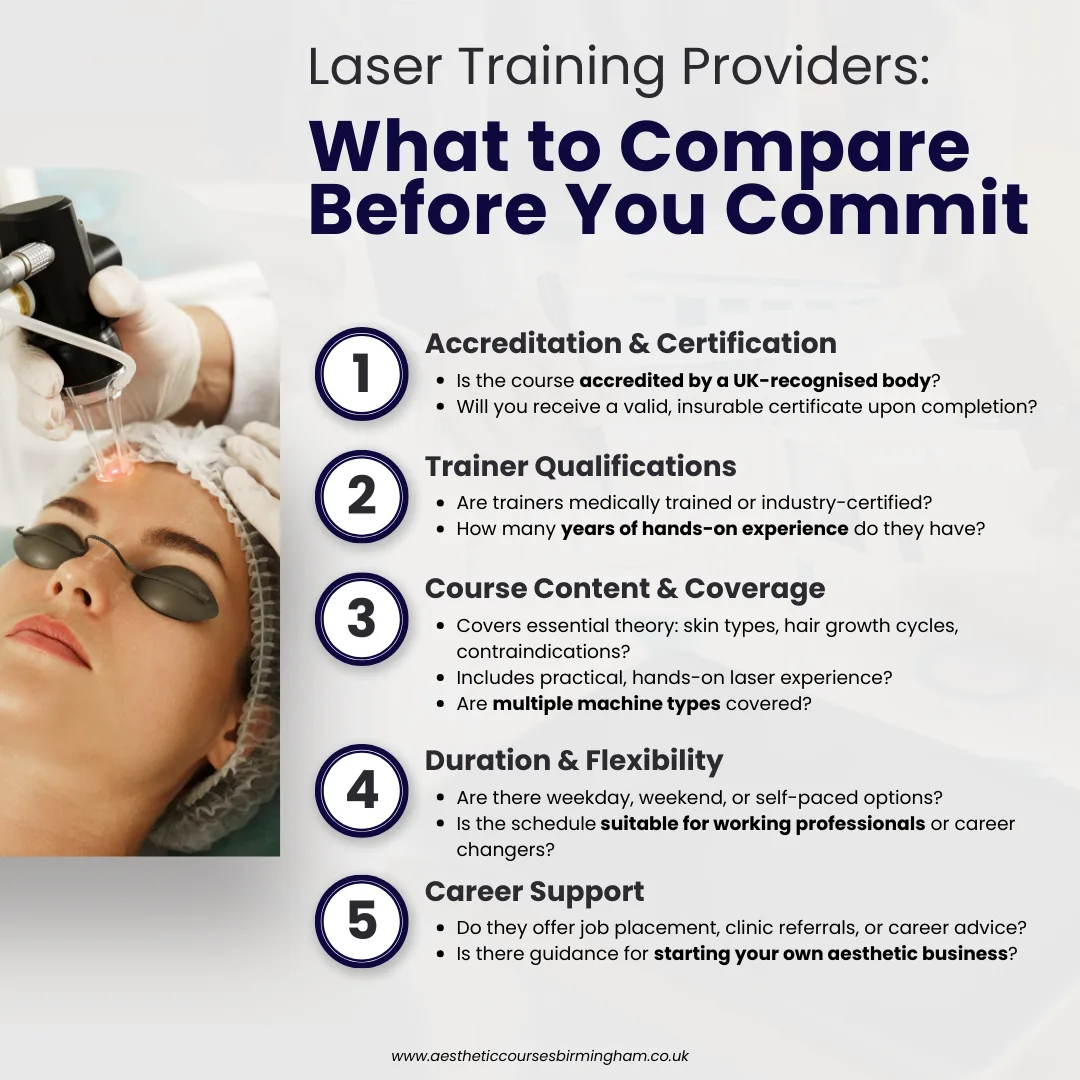
Key Takeaways
- Laser hair removal training costs vary based on factors like location, course duration, and provider reputation.
- Beginner courses typically cost less than advanced certifications, with prices ranging from £800 to £1,500.
- Be aware of additional fees such as equipment use, materials, and certification charges.
- Look for accredited training providers to ensure quality education and recognition in the industry.
- Financing options like payment plans and scholarships can help manage the costs of training.
Understanding Laser Hair Removal Training Costs

Factors Influencing Training Costs
Loads of things can change the price of a laser hair removal course. Where you take the course matters – London prices will probably be different from those in Liverpool. The level of the course is important too; a basic intro course will cost less than an advanced certification. And, of course, the provider’s reputation and accreditation play a big part. More established places often charge more, but you might get better training. Here’s a quick rundown:- Location: Big cities usually mean higher prices.
- Course Level: Beginner, advanced, or specialist.
- Provider Reputation: Well-known, accredited schools can cost more.
- Course Length: Longer courses usually cost more.
- Equipment Used: Courses using fancy, new lasers might be pricier.
Average Price Ranges
For a basic laser hair removal course in the UK, you’re probably looking at somewhere between £799 and £1,500. Advanced courses, especially those that give you a Level 4 certification, can easily go over £2,000. Keep in mind these are just averages, and prices can swing quite a bit depending on those factors we just talked about.Hidden Fees to Consider
Always check what’s included in the course fee. Some places might charge extra for things like registration, exam fees, or even the cost of materials. And don’t forget about VAT, make sure the price they’re advertising includes it, or you could be in for a nasty surprise. It’s also worth asking if you need to bring your own models to practise on, as that could add to your costs.It’s easy to focus on the headline price, but it’s worth digging a little deeper. Ask for a complete breakdown of all the costs involved before you sign up for anything. That way, you know exactly where your money is going and can avoid any unexpected bills later on.
Types of Laser Hair Removal Training Courses
Where do you start with the training? It can all seem a bit overwhelming, but breaking it down into the different types of courses available makes it much easier. Let’s have a look at what’s out there.Beginner Courses
These are your entry-level courses, perfect if you’re completely new to the world of lasers and IPL. They’ll give you the foundational knowledge you need to understand the basics. Think of it as learning to walk before you can run. You’ll cover things like:- Skin anatomy and physiology
- Laser safety protocols
- Different types of lasers and how they work
- Client consultation and assessment
- Basic treatment techniques
Advanced Certification Options
Once you’ve got the basics down, you might want to consider an advanced certification. These courses build on your existing knowledge and skills, allowing you to offer more specialised treatments. Level 4 laser training is a common option. These courses might cover:- Advanced laser techniques
- Treatment of different skin types and conditions
- Laser tattoo removal
- Skin rejuvenation techniques
- Management of complications
Specialised Training Programmes
These are courses that focus on specific areas of laser treatment. For example, you might find courses that specialise in:- Laser hair removal for specific body areas (e.g., Brazilian, face)
- Treatment of specific skin conditions (e.g., acne, pigmentation)
- Use of specific laser technologies (e.g., Nd:YAG, Alexandrite)
Choosing the right type of laser hair removal training course depends on your current experience level and your career goals. Start with a beginner course to get the basics, then consider advanced certifications or specialised programmes to further your skills and knowledge. Don’t be afraid to ask questions and do your research to find the course that’s right for you.
Comparing Training Providers

Accreditation and Recognition
First things first, check if the training provider is properly accredited. Accreditation means the course meets certain standards and is recognised by industry bodies. This is super important because it affects whether you can get insurance and whether employers will take your qualification seriously.Course Content and Duration
Have a good look at what the course actually covers.- Does it include the essential theory, like laser physics and skin types?
- What about practical, hands-on experience?
- And how long does the course last?
Student Support and Resources
Think about what kind of support you’ll get during and after the course.- Will you have access to instructors if you have questions?
- Does the training provider offer any career advice or help with finding a job?
Financing Your Laser Hair Removal Training
Payment Plans and Options
The good news is that many training providers understand this and offer a range of payment plans to make it more manageable.- Instalment Plans: These allow you to spread the cost over several months, often without hefty interest charges. It’s like paying for your course in bite-sized pieces.
- Deposit Options: Securing your spot with a smaller deposit upfront can ease the initial financial strain. Some providers even offer deposits as low as £100.
- Third-Party Finance: Some training centres partner with finance companies to provide loans specifically for education. These might require a credit check, so be prepared.
It’s always worth asking about all available payment options and comparing the terms. Don’t be afraid to negotiate or ask for a plan that suits your budget. Remember, investing in yourself is the best investment you can make!
Scholarships and Grants
Okay, so payment plans are helpful, but what if you could get some free money towards your training? It’s worth exploring scholarship and grant opportunities. These can significantly reduce the financial burden, making your dream of becoming a laser technician a reality.- Professional Associations: Check with industry bodies. They sometimes offer grants to encourage professional development.
- Government Schemes: Keep an eye out for government-funded initiatives that support skills training in the beauty sector. These can be region-specific, so do your research.
- Training Provider Scholarships: Some training providers offer their own scholarships based on merit or financial need. It never hurts to ask!
Return on Investment
Let’s talk about the bigger picture: your return on investment (ROI). Think of laser hair removal training not just as an expense, but as an investment in your future. A one-off payment can unlock a whole new career path with serious earning potential. Consider these points:- Increased Earning Potential: Qualified laser technicians are in demand, and you can command higher fees for your services.
- Business Opportunities: Training can open doors to starting your own laser hair removal business, giving you control over your income.
- Client Retention: Laser hair removal is a popular treatment, and satisfied clients are likely to return for repeat sessions, building a stable income stream.
Benefits of Investing in Laser Hair Removal Training
Career Advancement Opportunities
One of the biggest perks is definitely the career boost. Getting certified can seriously open doors. Think about it: you could move up in your current salon or clinic, maybe even land a job at a specialist aesthetics place. Plus, with the right skills, you might even consider starting your own business. It’s all about having that edge in a competitive market.Skill Diversification
Laser hair removal training can teach you about skin types, laser safety, and client consultation – skills that are useful across the board in the beauty industry. Plus, some courses even cover other treatments like tattoo removal or carbon facials. It’s a great way to make yourself more employable and offer a wider range of services to your clients.Client Satisfaction and Retention
Happy clients are repeat clients, right? And what makes clients happy? Getting great results, feeling safe, and trusting their therapist. With proper laser hair removal training, you’ll be able to deliver all of that. You’ll know how to tailor treatments to different skin types, minimise risks, and provide aftercare advice. This leads to better outcomes, happier customers, and a solid reputation that keeps them coming back. It’s a win-win, really.Investing in laser hair removal training is more than just learning a new skill; it’s about investing in your future. It’s about providing a service that people want and are willing to pay for, and doing it safely and effectively. It’s about building a career that’s both rewarding and profitable.
What to Expect from Your Training Experience
It’s natural to wonder what the experience will actually be like. Let’s break down what you can typically expect.Hands-On Practise
Theory is important, sure, but the real learning happens when you get to grips with the equipment. Expect a significant portion of your course to be dedicated to hands-on practise. This will involve:- Working with different types of laser machines.
- Learning how to adjust settings for various skin types and hair colours.
- Practising treatment techniques on models (or fellow students).
- Understanding safety protocols and emergency procedures.
Expert Instructors
Your instructors will be experienced professionals with a background in laser hair removal and aesthetics. They’re there to guide you, answer your questions, and share their knowledge. Don’t be afraid to ask questions – no matter how small they seem. A good instructor will:- Have years of practical experience in the field.
- Be qualified to teach and assess your skills.
- Provide clear and concise explanations.
- Offer individual support and guidance.
- Create a supportive and encouraging learning environment.
Networking Opportunities
Training courses aren’t just about learning the technical skills; they’re also a fantastic opportunity to build your professional network. You’ll be surrounded by like-minded individuals who are also passionate about aesthetics. Use this time to:- Connect with your fellow students.
- Share experiences and learn from each other.
- Build relationships with your instructors.
- Attend any industry events or workshops that may be part of the course.
Building a strong network can open doors to future job opportunities, collaborations, and ongoing support throughout your career.
Post-Training Certification and Career Pathways
Certification Requirements
What’s next? Getting certified is a big deal. It’s not just a piece of paper; it shows you know your stuff and can be trusted to zap away unwanted hair safely. Usually, you’ll get a certificate after passing your course, but make sure it’s from a recognised awarding body. This bit is important because some employers and insurance companies only accept certain certifications. Check with your local council too, as they might have specific rules about qualifications.Job Opportunities
The good news is, there are quite a few places you could work. Salons and beauty clinics are the obvious ones, but you could also find jobs in specialist laser clinics or even some medical practises. Starting your own business is also an option, but that needs a bit more planning and investment. Think about where you want to work and what kind of clients you want to treat. Do you fancy a busy high-street salon or a more relaxed, private clinic? Your choice!Continuing Education
Don’t think the learning stops after your initial training. The world of laser technology is always changing, with new machines and techniques popping up all the time. To stay ahead, it’s a good idea to keep learning. This could mean doing advanced courses, going to industry workshops, or even just reading up on the latest research.Keeping your skills fresh not only makes you better at your job, but it also makes you more attractive to employers and clients. Plus, it keeps things interesting! Think of it as an investment in your future – the more you learn, the more you earn (hopefully!).
Conclusion
Investing in laser hair removal training can be a significant step towards advancing your career in the beauty and aesthetics industry. While the costs can vary based on the course and location, the potential for increased earnings and client satisfaction makes it worthwhile. Remember, it’s not just about the price tag; it’s about the skills and knowledge on your well-established aesthetic course that you can gain that can set you apart in a competitive market. So, if you’re considering this path, take the plunge. With the right training, you can offer valuable services that meet the needs of your clients and help you thrive professionally.Frequently Asked Questions
What factors affect the cost of laser hair removal training?
The price of laser hair removal training can change based on the course type, location, and the school you choose. Other things like the equipment used and how long the course lasts also matter.
How much do laser hair removal training courses usually cost?
Most training courses for laser hair removal cost between £800 and £1,500. Some advanced courses may be more expensive.
Are there any extra fees I should know about?
Yes, sometimes there are hidden costs like registration fees, materials, or equipment that you might need to buy.
What types of courses are available for beginners?
Beginners can find basic courses that teach the essentials of laser hair removal, including safety and techniques.
Can I get financial help for my training?
Yes, many schools offer payment plans, scholarships, or grants to help cover the costs.
What are the benefits of taking laser hair removal training?
Investing in this training can open up job opportunities, help you learn new skills, and improve client satisfaction in your work.





